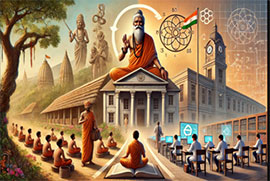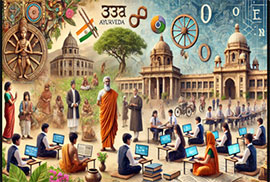The Evolution of India’s Educational Landscape

The educational landscape of India, marked by a profound history and significant transformations, reveals a rich tapestry of intellectual traditions and evolving pedagogical trends. From the ancient gurukul system to the modern institutions influenced by British policies, the journey of education in India is a compelling story of tradition, colonial impact, and a leap towards global leadership in producing skilled professionals.
Ancient Indian Education
In ancient India, education was not merely a means to acquire knowledge but a path toward personal development and spiritual growth. The earliest form of Indian education, the Gurukul system, involved students living with their guru (teacher) in small, rural settings, studying subjects that ranged from scriptures, philosophy, and mathematics to archery and warfare, tailored to the caste and community needs. This system emphasized discipline, moral education, and social responsibility, fostering a society balanced in religious, cultural, and economic values. During this time, India was a prosperous nation with a society rich in human values and largely devoid of poverty.
Influence of Religious and Regional Institutions
In addition to the gurukuls, India was home to some of the world’s first universities, such as Takshashila (Taxila) and Nalanda. These institutions attracted scholars from across the globe, offering advanced studies in diverse fields like medicine, mathematics, astronomy, and logic. Highly structured and intellectually rigorous, these centers produced pioneering works that influenced thought and learning beyond India’s borders, contributing to global knowledge.
Ayurveda: India’s Ancient Healthcare Science
Ayurveda, India’s ancient “science of life,” is a holistic healthcare system over 5,000 years old. It emphasizes harmony between body, mind, and spirit through personalized practices and natural remedies. Ayurveda centers on the doshas—Vata, Pitta, and Kapha—unique combinations of elements that define an individual’s health tendencies. Imbalances in these doshas can cause illness, and Ayurvedic treatments aim to restore balance using lifestyle adjustments and natural medicines.
Ayurveda’s therapies include herbal remedies like turmeric and ashwagandha, customized diets, and Panchakarma detoxification. Integral practices such as yoga and meditation support mental clarity and emotional stability. Globally recognized, including by the World Health Organization, Ayurveda appeals to those seeking preventive, sustainable health practices. Today, its ancient wisdom continues to inspire wellness worldwide, promoting holistic health and balance.
British Colonial Impact
The British colonial era introduced a new educational system in India, aimed primarily at creating a class of individuals Indian in origin but British in thought and manner. This system established English as the primary medium of instruction and introduced European curricula, which shifted the focus from traditional to more Western educational standards. The British also established colleges and universities, laying the groundwork for modern higher education in India. This new system introduced a bureaucratic structure that served the administrative needs of the colonial government and permanently changed the face of Indian education. This education has elevated the Indian education system to a high global quality standard. Consequently, it has enhanced India’s capabilities in terms of competitive knowledge and intellectual levels. Additionally, it prioritizes merit, offering equal opportunities regardless of gender, caste, or socioeconomic status.
Post-Independence Developments

After gaining independence, India faced the enormous challenge of educating a diverse, vast population. The government prioritized literacy promoted regional languages alongside English and expanded higher education infrastructure. State Government Institutes of Technology, engineering colleges, polytechnic, including the renowned Indian Institutes of Technology and Management were established to cultivate engineers, scientists, management and technicians essential to building a modern Indian state. This emphasis laid the groundwork for a generation of innovators and thought leaders. Additionally, the fees for government-funded universities in India are very low or almost free. However, admission is highly competitive due to the rigorous entrance exams. Only exceptionally talented students can secure admission based on merit.
Globalization and Its Impact
With economic liberalization in the early 1990s, India’s integration into the global economy accelerated, necessitating an education system aligned with international standards. There was a marked shift towards specializations in medicine, information technology, and management, preparing a skilled workforce in fields essential for economic growth. As a result, Indian professionals began to make significant contributions globally, especially in STEM and IT sectors.
India as a Hub of Skilled Professionals
India’s educational reforms have propelled it to become one of the largest exporters of skilled talent. Millions of highly trained Indian professionals, including doctors, engineers, scientists, and IT specialists, are now making their mark worldwide. The rigor and breadth of India’s education system, particularly in technical and professional fields, have cemented India’s position as a global leader in providing a skilled workforce.
The Concept of Zero
Among ancient India’s most influential contributions to global knowledge was the concept of zero, developed during the classical period. This mathematical breakthrough revolutionized arithmetic and profoundly influenced global understanding of mathematics as a discipline, demonstrating India’s long-standing tradition of intellectual contributions.
Conclusion
From the ancient philosophies of the gurukul system to the high-tech classrooms of modern India, the Indian education system has evolved dramatically, shaped by social, economic, and political changes. Today, it stands as a testament to the nation’s resilience and adaptability, blending a rich heritage with progressive aspirations. The Indian education system continues to deliver competent resources to the world, upholding India’s legacy of scholarly excellence and global intellectual contributions.
Profile
Pankaj Garg
CEO Innovation Thru Energy Co., Ltd, (ITE)

Pankaj Garg holds a degree in Computer Science Engineering from the National Institute of Technology and an MBA in Marketing from Fox Business School, USA. He embarked on his journey to Japan 34 years ago and, over the past 34+ years, has built a distinguished career specializing in AI, robotics, semiconductors, applied engineering, and new product invention and development. He has contributed his expertise to prestigious organizations such as Kobe Steel, Yaskawa Electric, Cirrus Logic, Intel, and NASA/Caltech startups. His broad skill set encompasses R&D, engineering, product manufacturing, and global technical sales and marketing.
Pankaj also holds over 30 patents in the areas of semiconductors, green energy, and next-generation energy, reflecting his innovative contributions to these cutting-edge industries.
Driven by a mission to tackle critical global challenges like climate change, food waste, and pharmaceutical cold chain deficiencies, Pankaj set out to create a seamless, globally standardized cold chain logistics system. After leaving Intel, he founded ITE Co., Ltd. in 2007, entirely self-funded. Today, ITE serves over 250 clients globally, with a growing presence in the Indian market. Inspired by Japan’s dedication to innovation and craftsmanship, Pankaj has fostered a culture of excellence, integrity, and continuous improvement at ITE. His guiding principles are drawn from the teachings of Karma (as outlined in the Bhagavad Gita) and Kaizen, along with his extensive global business experience, particularly in the U.S., which shape ITE’s customer-first philosophy.
Pankaj possesses deep expertise in areas such as Digital Transformation (DX), semiconductors, the food retail industry, medical cold chains, pharmaceuticals, GDP/GMP standards, life sciences, cold chain logistics value chains, Ayurveda, yoga, and the food industry. This diverse knowledge has been instrumental in his success across multiple domains, positioning him as a visionary leader in cold chain logistics, climate change initiatives, and the green energy sector. Under his leadership, ITE stands as a testament to his technical expertise, entrepreneurial spirit, and commitment to solving global challenges.
Innovation Thru Energy Co., Ltd.
Since its establishment in 2007, Innovation Thru Energy Co., Ltd. (ITE) has been a company specializing in temperature management, providing its unique IceBattery(R) System—a comprehensive cold chain logistics platform and DX solutions—to over 250 companies worldwide. All IceBattery(R) products are designed and developed in-house. The IceBattery(R) System is a revolutionary cooling system capable of maintaining uniform internal temperatures for extended periods across all modes of transportation, from 4L boxes to 40FT large containers/trucks.
For this column
Having spent over 35 years in Japan, my perspective on the country, its culture, and its people is shaped by a unique blend of an Indian heritage and deep integration into Japanese society. My family’s global ties, including my grandfather’s role as Vice Ambassador to Japan in 1959, have instilled in me a broad, inclusive worldview.
I see Japan and India as deeply complementary, with shared values and a synergistic relationship rooted in history, culture, and religion. Japan’s support for India during World War II and the spiritual connections between the two nations underscore this bond.
I believe in harnessing this synergy to create a powerful partnership where India’s global leadership and Japan’s excellence in business, manufacturing, and operational efficiency can unite. Together, we can forge a path towards a future that embodies the true essence of Buddhism and Karma—bringing peace, prosperity, and wisdom to the world as one united family.
contents
- 【Unlocking New Possibilities through Market Characteristics and Cultural Understanding in India】1.A Journey Through India’s History and Cultural Ethos Pankaj Garg – CEO Innovation Thru Energy Co., Ltd, (ITE)
- 【Unlocking New Possibilities through Market Characteristics and Cultural Understanding in India】2.India’s Strategic Alliances and Global Influence Pankaj Garg – CEO Innovation Thru Energy Co., Ltd, (ITE)
- 【Unlocking New Possibilities through Market Characteristics and Cultural Understanding in India】3.The Evolution of India’s Educational Landscape Pankaj Garg – CEO Innovation Thru Energy Co., Ltd, (ITE)
- 【Unlocking New Possibilities through Market Characteristics and Cultural Understanding in India】4.India’s Industrial Growth Since Independence: The Role of State-Owned Enterprises, Private Sector, and Overseas Collaboration Pankaj Garg – CEO Innovation Thru Energy Co., Ltd, (ITE)
- 【Unlocking New Possibilities through Market Characteristics and Cultural Understanding in India】5.India’s Healthcare System: A Comprehensive Overview Pankaj Garg – CEO Innovation Thru Energy Co., Ltd, (ITE)
- 【Unlocking New Possibilities through Market Characteristics and Cultural Understanding in India】6.Introduction to Ayurveda Pankaj Garg – CEO Innovation Thru Energy Co., Ltd, (ITE)
- 【Unlocking New Possibilities through Market Characteristics and Cultural Understanding in India】7.Ayurveda for a Healthy and Balanced Life Pankaj Garg – CEO Innovation Thru Energy Co., Ltd, (ITE)


















